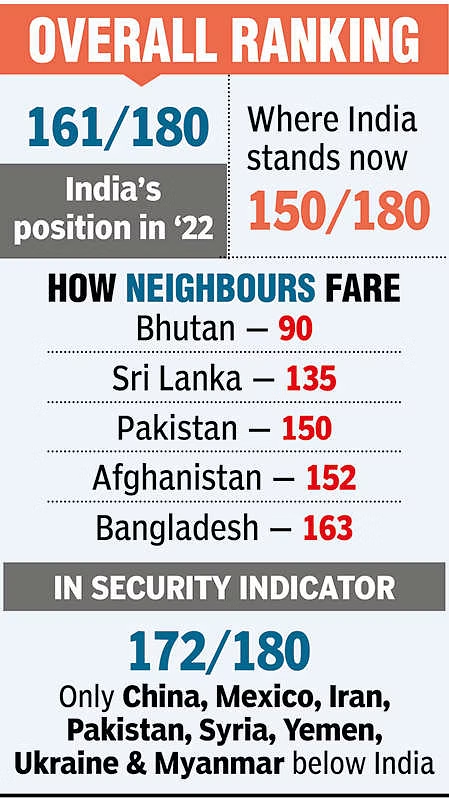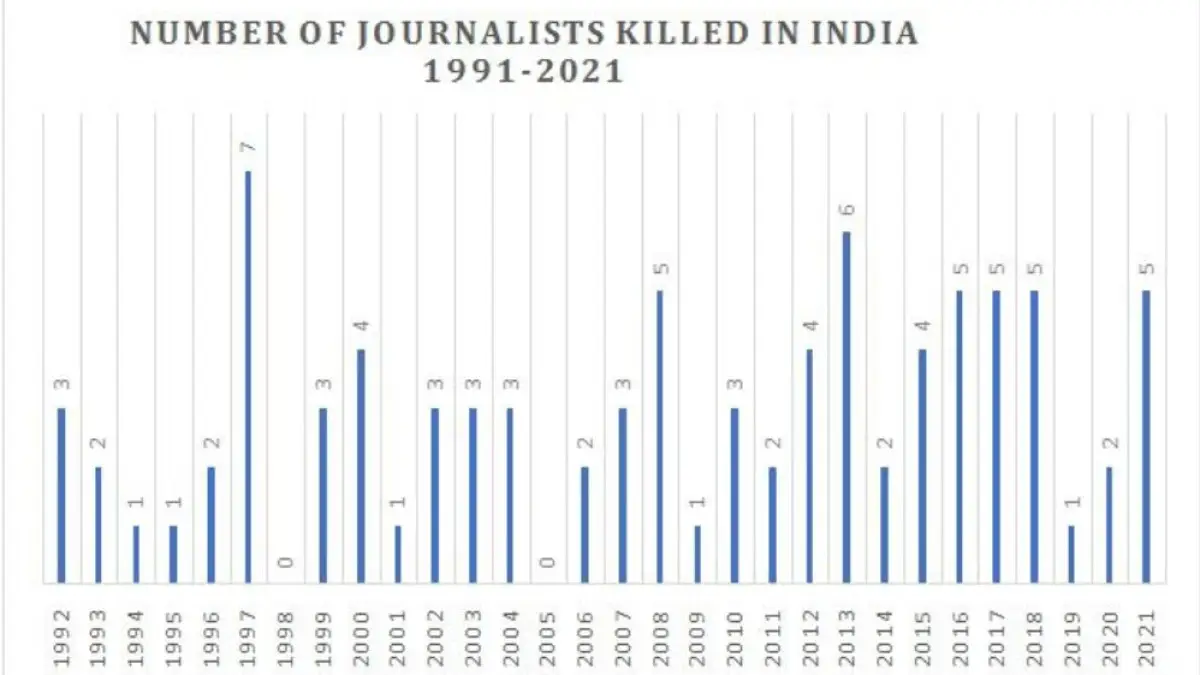Indian Polity
Press Freedom in India
- 11 Oct 2023
- 15 min read
This editorial analysis is based on “The silence around the state’s seizure of India’s press” which was published in The Hindu on 10/10/2023. It talks about how India is passing through a transitory emergency as well as a marked phase of digital authoritarianism. In this context, it appears that the higher judiciary is displaying reluctance to take decisive action.
For Prelims: World Press Freedom Index, Reporters Without Border, Freedom of press, Freedom of speech and expression, Press Council of India, Ministry of Information and Broadcasting, News Broadcasters Association (NBA), UN Plan of Action on the Safety of Journalists
For Mains: Press Freedom In India, India's performance in World Press Freedom Index, Importance of free press in India, Institutions safeguarding press freedom, Challenges around free press in India,Measures to ensure free press in India.
A free press plays a crucial role in safeguarding democracy and fostering a transparent and accountable government. However, recent actions against journalists associated with the online portal NewsClick, including raids, seizures, and arrests, have intensified concerns about the protection of digital data and press freedom in India.
- In the midst of the digital revolution, India confronts a threat from digital authoritarianism. At this critical juncture, India needs both political action and judicial determination to safeguard press freedom in the country.
What does the term "Press Freedom" mean?
Press freedom is a fundamental principle that allows journalists and media organizations to operate without censorship or government interference. It is a core component of freedom of expression and is essential for a democratic society.
Press freedom encompasses the following key aspects:
- Freedom from Censorship: Journalists and media outlets should be able to publish or broadcast news and information without government-imposed censorship.
- Access to Information: A free press should have access to information and sources to investigate and report on matters of public interest.
- Independence: Editorial independence ensures that news reporting is based on facts and not influenced by outside interests.
- Protection of Sources: Journalists should be able to protect their sources to encourage whistleblowers and informants to come forward with information without fear of exposure or reprisal.
- Pluralism and Diversity: A free press should encompass a diverse range of viewpoints and opinions, allowing for open debate and discussion in society.
- Accountability: The media should hold those in power accountable by investigating and reporting on their actions and decisions.
Constitutional Background:
- Freedom of the Press is nowhere mentioned in the Constitution. However, Freedom of press or media refers to the rights given by the Constitution of India under the freedom and expression of speech in Article 19(1)(a). It encourages independent journalism and promotes democracy by letting the people voice their opinions for or against the government’s actions.
- Article 19 of Universal Declaration of Human Rights enshrined that everyone has the right to freedom of opinion and expression; this right includes freedom to hold opinions without interference and to seek, receive and impart information and ideas through any media and regardless of frontiers.
- However, there are certain restrictions in Article 19(2) to protect the nation and its integrity.
Status of Press Freedom in India :
|
 |
What is the Importance of a Free Press for India?
- Democracy and Accountability: Journalists investigate and report on government actions, policies, and decisions, holding officials accountable for their actions.
- Information Dissemination: It helps citizens stay informed about current events, government activities, and societal issues, enabling them to make informed decisions and participate actively in the democratic process.
- Check on Power: A free press acts as a check on the abuse of power by the government and other powerful entities. It helps uncover corruption, human rights abuses, and other wrongdoing, making it difficult for those in authority to act with impunity.
- Transparency and Accountability: A free press promotes transparency in government operations and decision-making processes. It helps uncover hidden agendas, conflicts of interest, and other factors that may influence government actions.
- Diverse Voices: India is a diverse country with a multitude of languages, cultures, and perspectives. A free press provides a platform for diverse voices and viewpoints, ensuring that the concerns of various communities are heard.
- Protection of Fundamental Rights: A free press is a guardian of fundamental rights, including the right to freedom of expression and the right to know. It helps protect these rights by advocating for the rights of individuals and groups.
- International Standing: India's reputation on the global stage is influenced by its commitment to press freedom. Upholding press freedom demonstrates a commitment to democratic values and human rights, enhancing India's standing in the international community.
Which Institutions are Responsible for Protecting Press Freedom in India?
- Press Council of India (PCI): The Press Council of India is a statutory body established under the Press Council Act, 1978. It acts as a watchdog to safeguard and promote press freedom and the ethical standards of journalism.
- Ministry of Information and Broadcasting: The Ministry of Information and Broadcasting is a government body responsible for formulating policies and guidelines related to the media sector in India.
- News Broadcasters Association (NBA): NBA is a self-regulatory body representing the private television news and current affairs broadcasters in India. It formulates and enforces a code of ethics and standards for television news channels.
- Editors Guild of India: This is a voluntary association of editors of leading newspapers and news magazines in India. It plays a crucial role in defending press freedom and addressing issues related to the rights and responsibilities of journalists.
- Legal System: India's legal system, including the judiciary, plays a significant role in upholding press freedom. Courts have the authority to address violations of press freedom, protect journalists, and interpret laws related to media.
- In 1950, the Supreme Court in Romesh Thappar v. The State of Madras observed that freedom of the press lay at the foundation of all democratic organizations.
- International Organizations: International organizations such as Reporters Without Borders (RSF) and the Committee to Protect Journalists (CPJ) monitor press freedom in India and raise awareness about violations on the global stage.
What are the Challenges associated with Press Freedom in India?
- Legal and Regulatory Constraints: India has laws that can be used to restrict press freedom, such as defamation laws, sedition laws, and laws related to national security. These laws are sometimes used to intimidate journalists and media organizations.
- Government Interference: There have been instances of government interference in the editorial independence of media outlets. Governments may use advertising budgets as a tool to reward or punish media organizations, which can influence their reporting.
- Threats and Violence: Journalists in India often face physical threats and violence, especially when reporting on sensitive issues like corruption, organized crime, or communal tensions. Some journalists have been attacked or even killed in the line of duty.
- Self-Censorship: Due to fear of reprisals or pressure from various sources, journalists and media outlets may engage in self-censorship, avoiding certain topics or taking a cautious approach to reporting.
- Ownership and Control: Media ownership in India is often concentrated in the hands of a few powerful entities, which can influence editorial decisions and limit the diversity of voices in the media landscape.
- Defamation Lawsuits: Journalists and media organizations in India are frequently targeted with defamation lawsuits, which can be time-consuming and financially burdensome.
What Measures can be Taken to Ensure a Free and Impartial Press in India?
- Strengthen Legal Protections:
- Reform laws that can be misused to restrict press freedom, such as defamation and sedition laws.
- Ensure swift and fair legal processes in cases involving press freedom violations.
- Independent Regulatory Framework:
- Establish independent media regulatory bodies with members representing a cross-section of society, ensuring that they are free from government control and political influence.
- Protect Journalists and Whistleblowers:
- Enact and enforce laws that protect journalists from harassment, violence, and threats, both online and offline.
- Establish mechanisms to protect whistleblowers who provide information to the media in the public interest.
- Promote Transparency:
- Enact robust freedom of information or access to information laws to promote transparency and enable journalists to access government information.
- Promote transparency in media ownership to prevent media concentration and conflicts of interest..
- Public Broadcasting Independence:
- Ensure the independence of public broadcasting institutions from government control and influence.
- Appoint qualified and impartial boards to oversee public broadcasters, and ensure their funding is secure and nonpartisan.
- Promote Journalistic Ethics:
- Encourage media organizations to adhere to a code of ethics that emphasizes accuracy, fairness, and balanced reporting.
- Support professional development and training for journalists to maintain high ethical standards.
- Raise public awareness about the importance of a free and impartial press in a democratic society.
- International Cooperation:
- Collaborate with international organizations, such as UNESCO and international press freedom groups, to promote press freedom and share best practices.
- The UN Plan of Action on the Safety of Journalists aims to create a free and safe environment for journalists and media workers.
Conclusion
Addressing the issue of press freedom in India will require a concerted effort from various stakeholders, with a shared commitment to upholding the principles of a free press in a democratic society. It is a complex challenge that needs continuous attention and action to ensure a vibrant and independent media environment in the country.
|
Drishti Mains Question Discuss about the key challenges to press freedom in India.Suggest measures for the protection and promotion of a free and independent press in the country? |
Legal Insights
UPSC Civil Services Examination, Previous Year Questions (PYQs)
Prelims
Q. Right to Privacy is protected as an intrinsic part of Right to Life and Personal Liberty. Which of the following in the Constitution of India correctly and appropriately imply the above statement? (2018)
(a) Article 14 and the provisions under the 42nd Amendment to the Constitution.
(b) Article 17 and the Directive Principles of State Policy in Part IV.
(c) Article 21 and the freedoms guaranteed in Part III.
(d) Article 24 and the provisions under the 44th Amendment to the Constitution.
Ans: (c)
Mains:
Q. What do you understand by the concept of “freedom of speech and expression”? Does it cover hate speech also? Why do the films in India stand on a slightly different plane from other forms of expression? Discuss. (2014)





